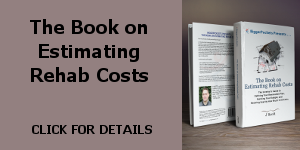I have had many people ask me how to go about evaluating their first deal. Whether they should do their inspections before getting the property under contract, how they can determine repair costs, how to find contractors, etc. And considering it was less than a year ago that I was doing this all for the first time myself, I can certainly empathize with the apprehension and the confusion that goes along with buying a first investment property.
So, I thought I’d write up a quick list of 10 (not so easy) steps that I would recommend to anyone who might be looking to jump on their first deal, and doesn’t know where to start (I’ll go into more detail on many of these things in future posts):
- First, you need to decide where your deals are going to come from. Will you be marketing and trying to find motivated sellers on your own? Will you purchase off the MLS? Will you get deals from other investors? While there’s no right or wrong answer to this question, I’ve found that given the current state of real estate market, there are plenty of fantastic deals just sitting on the MLS waiting to be had. Most of these are bank owned foreclosures (“REOs,” as they’re known), and banks are currently willing to sell at $.50, $.40 or even $.30 on the dollar. So, if you don’t know where to start looking for deals, the MLS might be a good place…
- Next, you need to have your financing in order. Will you be paying cash for your first property? Probably not. So, you need to find a lender. If you can qualify for a traditional mortgage, you can walk into any bank and fill out an application. The downside to that is your rehab costs will not be funding by the lender. Your other option is a “rehab loan” through a lender who is accustomed to working with investors. These lenders make their financing decisions not just based on your financial situation — they’ll evaluate the deal as well to ensure that it is a good investment. Rehab lenders cost a little more (you may pay 10-14% interest), but because they will fund both the purchase and rehab costs, they’re a good choice for many investors. Another option is “hard money lenders” (HML). Many HMLs will lend strictly based on the investment (i.e., you don’t have to have great credit or income), but generally charge very high interest rates and several percent upfront on the loan.
- Now, if you do plan to get your deals off the MLS, you need to find a real estate agent who is familiar with putting in offers on REO property and who is wiling to work with you to find these lower-priced deals. If you’re in the Atlanta area, let me know and I’m happy to refer you to an agent (my wife may even be able to help, let me know); if you’re elsewhere, ask around…it shouldn’t be too difficult to find an agent who is familiar with REOs and the process that goes along with them.
- Once you find a property that you think might be a good deal, it’s time to make an offer. Again, if it’s off the MLS, your agent can help you with this. In fact, they’ll do all the work for you — you just need to tell them the details of the offer and then sign your name. What details will they be looking for? Specifically, they’re going to want to know how much you want to offer, how you will be financing, how much you are willing to put down in “earnest money,” and how much “due diligence” time you will need. Earnest money is a deposit…you pay this when you submit your contract, and assuming you fulfill your end of the bargain, that money goes towards the purchase of the property at closing. If you don’t fulfill your end of the bargain, you could end up losing this money to the seller. Due diligence is the amount of time you have evaluate the property, get it inspected, and decide if you want to go through with the deal. With most standard contracts, you have the option to back out of the deal (and get your earnest money back) at any point during your due diligence period.
- At this point, you’ll negotiate for days, weeks, or even months before you either get the property or negotiations break down (i.e., neither side is willing to improve their offer). If you and the seller come to an agreement on terms, your due diligence period will begin. It’s typical to ask for about 7 days due diligence, giving you 7 days to figure out if this deal is a good one.
- Once you begin your due diligence period, you will get an inspector to come out an give you a report on the condition of the property. He should be able to tell you about the condition of all the major structural and “expensive” components, such as foundation, electrical, plumbing, roof, hvac, etc. A good one will also tell you about the obvious stuff as well (windows that won’t open, light switches that don’t work, etc), in case you really have no experience. A good inspection will run you between $150-500, depending on the inspector and how comprehensive the inspection is.
- Once you have your inspection report, find a contractor (or more than one) to come out and give you either an estimate or bid. If you plan to have the work contracted out, you can ask the contractors for a bid, and they will provide you a full statement of work with their price proposal for free (they expect they might get a job out of it). If you don’t plan to hire contractors, then find a contractor who will — for $100 or less — come out and give you a “pre-purchase estimate.” This will be a ballpark estimate of how much it would cost to rehab the property (most contractors will do this for a small fee). Keep in mind that the numbers may be higher or lower than your actual costs (depending on how you do rehab), but it’s a good ballpark. With a full inspection report and bids from a couple different contractors, you should now have a good idea of what it will cost to fix up your property.
- Now that you have your purchase price and your rehab costs, you can work with your real estate agent to get a good idea of what the property will sell for in fixed up condition. Your agent should be able to run a report off the MLS called a “Comparables Market Analysis” (CMA), which will give you an idea of what similar properties in similar condition have sold for recently in your area.
- Once you have an idea of what you’ll be able to sell the property for fixed up, you now have all the components necessary to do a basic evaluation of your deal, and to decide whether to move forward. If you add up your purchase price (including your financing and closing costs for the purchase), rehab costs, and holding costs (insurance, mortgage payments, utility costs, etc), you get an idea of the full cost of buying and fixing up the property (the “project cost”). Then, assume that you can sell the property for whatever your agent told you, but subtract 10% of that value for costs associated with the sale (agent commissions, closing costs, etc). This is your “sales revenue.” Subtract the project cost from the sales revenue, and that’s your projected profit.
- I would now recommend redoing the analysis in the step above, but making all worst-case assumptions. Assume that the rehab will be 10-15% more than you expect (it will be), assume the holding costs will be for twice as long as you expect (it could be), and assume your selling price will be 10-15% less than what your agent said (it will be). If based on those worst-case numbers, your projected profit still looks attractive, more forward with the deal. If not, go back to step #4 and make another offer…
While I know there was a lot of detail missing here, it’s a big topic for a single post…I’ll write more about many of the individual steps in upcoming posts…
[googmonify]9523523149:center:468:60[/googmonify]




J Scott,
Wanted to ask your opinion about financing. Obviously, you have cash reserves to purchase your first rehab project. For someone like me that do not have any cash reserves at all. What is the best option that I should concentrate my efforts on to obtain financing for first rehab project? Here is my scenario:
Great credit scores, Job history for 1 year and 6 months, no cash reserves. I can tap into personal lines of credit totaling 15K.
Traditional financing is out of the question since I do not have two years of job history, down payment, and cash reserves.
Do you have a list of HML you are currently using that you could recommend given my situation? I’m assuming that you are using local community banks to fund the acquisition and rehab, will they fund if you don’t have any cash reserves or is this something that they will overlook if the investment property numbers work? Any help will be greatly appreciated.
Personally, I would recommend having some cash reserves before you start your first project. While it’s definitely possible to raise the money through hard money sources, not having your own cash cushion makes things a good bit more stressful, and that’s the last thing you need when you’re starting your first project.
What I would suggest is one of four things:
1) Borrow money from family/friends;
2) Partner with someone who has the funds to help cover the rehab costs;
3) Try something like wholesaling to earn some cash that you can use for rehabbing;
4) Save up money from your job until you have enough to undertake your first project.
Hi J Scott,
Thanks again for the great info. Just had a quick question that I always wonder about. I understand the steps you outlined in this post (get offer accepted, get inspection, GC’s give bids, get CMA, make sure #’s work, close), my question is how do you know what to offer in the first place? Of course once a person has some experience you probably have a general idea of what a rehab will cost, but having no construction experience I don’t have a clue. Do you just make an offer that leaves room for rehab cost and then see if it will work. This seems like it would end up costing a lot for the inspections on properties you don’t close. Or do you have a gc come in before you even make an offer, this seems like it would wast a lot of your gc’s time to have them do a walk through before you have an offer accepted? Just trying to see what you did or what you recommend?